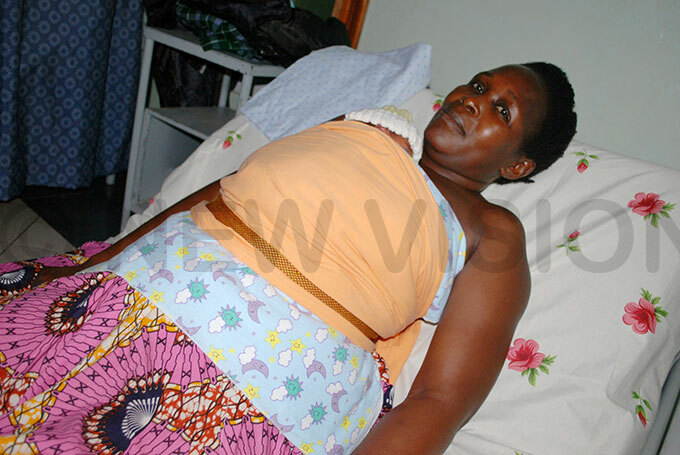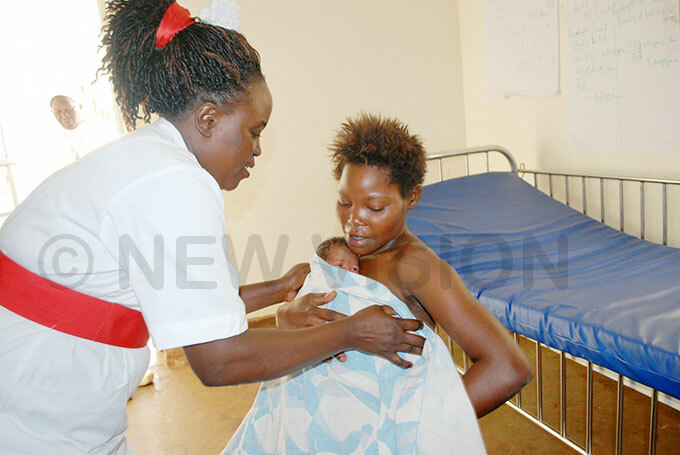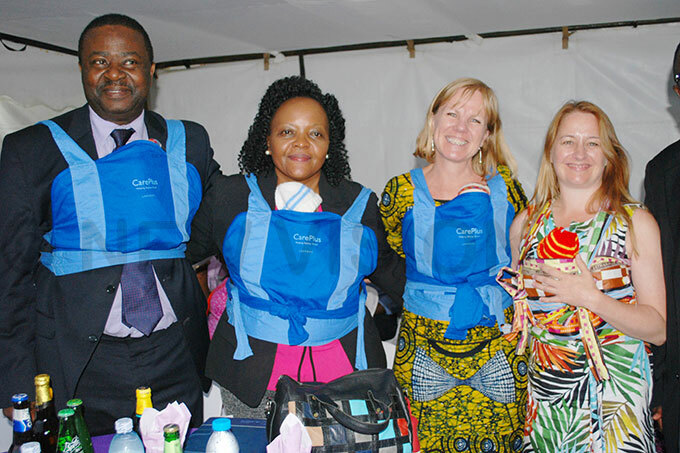New Kangaroo Mother Care clinical study launched
Kangaroo Mother Care consists of skin to skin positioning with the mother breastfeeding and giving supportive care
Bointa Bariho 26, stands beside an incubator watching the nurse administer intravenous medication to her newborn in the newborn care unit at Entebbe Hospital. The baby was born with difficulty in breathing and is also put on oxygen.
"Will my baby stabilize and gain weight?" asks anxious Bariho. Bariho delivered the baby at 7 months weighing 1.1 kgs.
Bariho's baby is one among the many small and unstable preterm babies who will soon benefit from the new clinical research dubbed "OmwaNa" study that was launched recently at Uganda Virus Research Institute (UVRI).
The study launched by the commissioner community health at the health ministry, Dr. Jesca Nsungwa Sabiiti will examine the impact of caring for unstable and low birth weight newborn babies of less than 32 weeks with organs that are not yet fully functional and are at the high risk of dying while in the nest position also termed as Kangaroo Mother Care (KMC).

World Health Organization (WHO) recommends Kangaroo Mother Care for newborns weighing less than 2000 grams and those that are clinically stable (off oxygen).
Kangaroo Mother Care consists of skin to skin positioning with the mother breastfeeding and giving supportive care. Premature birth is justified as a baby who is born before 37 weeks of gestation.
During the launch, Dr. Nsungwa noted that for the last 15 years Uganda's newborn mortality rate has stagnated at 27% per 1,000 live births with the problem of prematurity contributing greatly.
"The research will not only have an impact on premature mortality but will also improve the country's child mortality indices," she said.
In the effort to save the lives of vulnerable babies and improve indices for child mortality, she said a lot of work is being done to remodel health care systems, establish, newborn care units, special care units right from the primary level.
Additionally, a new scale-up plan has been developed to equip all health workers and trainers using the new KMS guidelines, she said.
Professor Joy Lawn from London School of Hygiene and Tropical Medicine who is the principal investigator said the new Kangaroo Mother Care (KMC) clinical trial will help reduce preterm deaths that Uganda is currently grappling with.
Highlighting the health benefits of the KMC study, Prof. Lawn explained that mothers will act as an incubator.
"When the baby is lying on the mother's chest, the health workers can put intravenous fluids and oxygen while the mother is providing warmth," she said. She adds that while the mother does Kangaroo Mother Care, her breathing and especially her heartbeat stimulates and reminds the baby also to breathe.
Besides, there is less risk of cross infections resulting from babies sharing incubators. Plus, the mother can breastfeed anytime the baby feels hungry.
Representing the Newborn Steering Committee, Dr. Harriet Ajilong said most of the unstable and low birth weight premature babies are put in incubators which are not readily available in most of the health facilities.
Ajilong also highlighted the problem of power shortage. Yet Kangaroo Mother Care is a low-cost effectively intervention that has been proven to improve the survival of the newborn babies.

Preterm mortality trends
Annually, Uganda loses 39,000 newborn babies and of this 40 %; an equivalent of 15,600 are preterm babies. This means the country loses about 42 premature babies every day with the common causes being; difficulty in breathing, infections of the blood low blood sugar and low body temperature among others.
As such, Uganda has one of the highest risks of prematurity births at 15% compared to Scandinavian countries where the premature birth rate stands at about 5%. This means Uganda has three times the risk of prematurity births and regions grappling with teenage pregnancy most affected, Prof. Lawn noted.
She said the trial is urgent if Uganda is to meet the Sustainable Development Goals.
The Sustainable Development Goals (SDG) 3.2 has a newborn death target of 12 or less. Over 40 countries in Africa with Uganda inclusive have a stiff plan to meet the target of 12 by 2030.
"With Uganda's newborn mortality rate stagnating at 27% per, there is a need to address the common causes of preterm death to be able to meet the SDG target by 2030," she said.

The two-year study is being conducted by London school in partnership with Medical Research Council /Uganda Virus Research Institute (MRC/UVRI), Makerere University and four public hospitals that include; Masaka, Jinja, Iganga, and Entebbe hospital.
Dr. Peter Waiswa the associate professor at Makerere School of Public Health and the principal investigator of the study said the study brings opportunity for capacity building of health workers in the four hospitals.
"A total of five health workers including; a doctor, two nurses and two midwives have been recruited in the four hospitals to work with the local pediatricians" Dr. Waiswa said.
This means the country will have an improved system of newborn care especially in the health facilities where the study is going to be conducted, he said.
The study coordinator, Dr. Ivan Mambule said they are restructuring the newborn care units to put beds for the mothers to lie while they do Kangaroo.
According to Dr. Mambule the pilot will start in phases due to the ongoing reconstruction. Entebbe and Iganga hospitals will start in October while the study in Jinja and Masaka hospitals will have commenced by end of November.